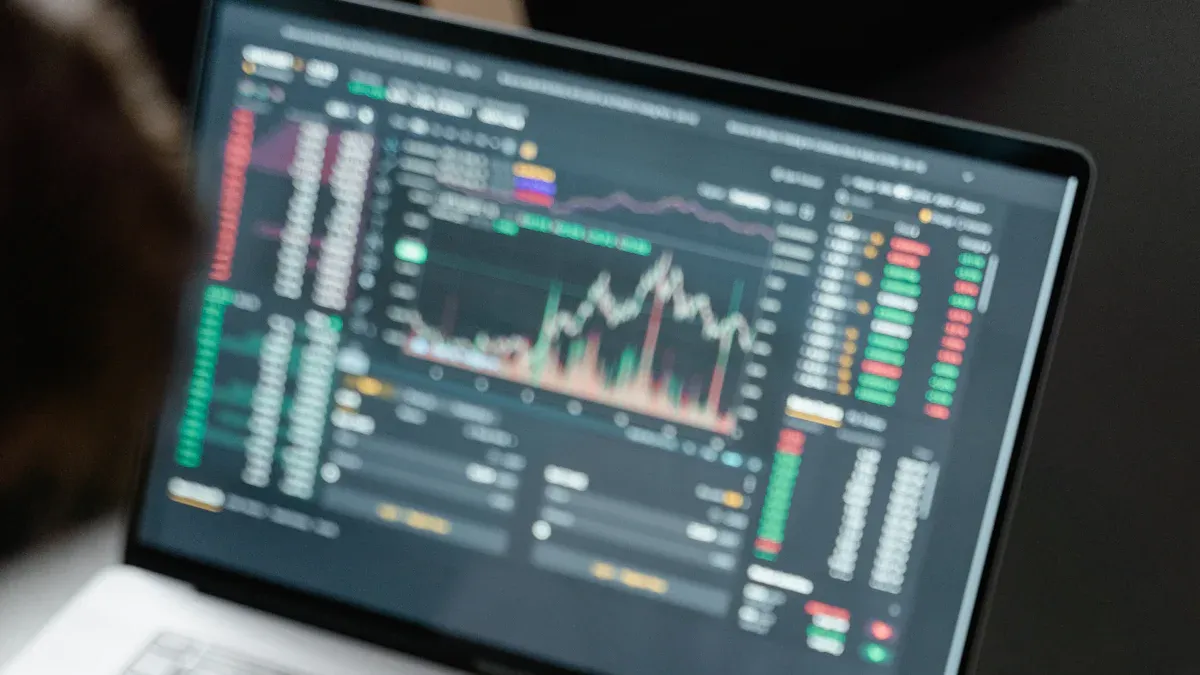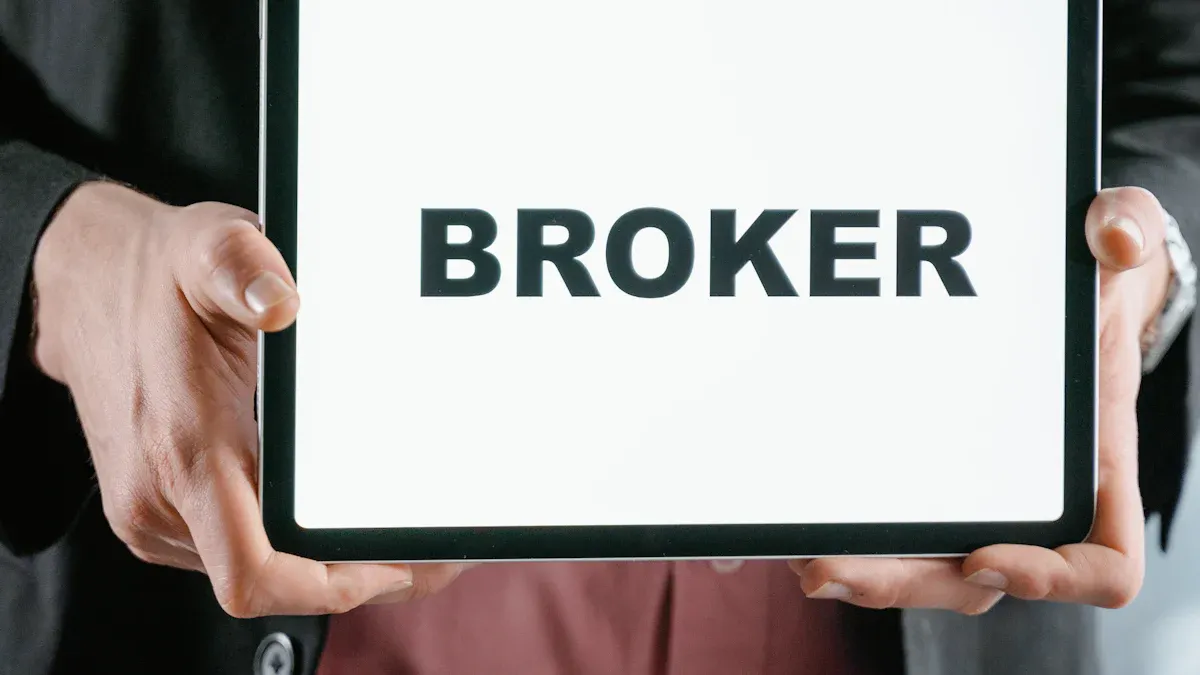- EasyCard
- Trade
- Help
- Announcement
- Academy
- SWIFT Code
- Iban Number
- Referral
- Customer Service
- Blog
- Creator
Investing in the Global Market: Knowledge of Brokerage Accounts You Need to Know

Image Source: pexels
When investing in global markets, you will find that a brokerage account is an indispensable tool. You can use it to access major markets like the U.S., gaining more opportunities. Many investors choose to open global market brokerage accounts for several main reasons, including:
- Better diversification
- More investment options
- Reduced volatility
Compared to local accounts, global market brokerage accounts differ significantly in market coverage, product types, and service methods. You need to understand these differences to make informed decisions.
Key Takeaways
- A brokerage account is a fundamental tool for investing in global markets, helping you conduct securities trading and asset management.
- Choosing the right brokerage account type (cash account or margin account) can be based on your risk preference and investment experience.
- Pay attention to the regulatory qualifications of the brokerage platform to ensure fund safety and compliance, reducing investment risks.
- Understand the fee structures of different platforms and choose a transparent account that suits your investment habits to lower costs.
- Maintain a focus on account security, regularly update passwords, and use two-factor authentication to protect personal information and fund safety.
Brokerage Account Basics

Image Source: pexels
Brokerage Account Definition
When investing in global markets, you first need to understand what a brokerage account is. According to definitions from major financial regulators, a brokerage account is a formal relationship established with a broker for conducting securities transactions, including buying and selling securities, securities lending, and holding stocks, bonds, or other assets. The following table summarizes the formal definition of a brokerage account:
| Item | Definition |
|---|---|
| Account | A formal relationship established with a broker for conducting securities transactions, including buying or selling securities and securities lending activities, and holding securities or other assets for safekeeping or as collateral. |
| Exclusions | Accounts obtained through acquisition, merger, asset purchase, or assumption of liabilities; or accounts opened for participation in an employee benefit plan under the Employee Retirement Income Security Act of 1974. |
Account Type Differences
You can choose different types of brokerage accounts based on your needs. Common types include cash accounts and margin accounts. The following are their main differences:
| Account Type | Definition | Advantages | Disadvantages |
|---|---|---|---|
| Cash Account | Allows trading only with the cash available in the account, no borrowing permitted. | Simple and easy to understand, suitable for beginners, reduces investment risk. | Lower flexibility, lower potential returns. |
| Margin Account | Allows investors to borrow funds for trading, using leverage. | Offers higher flexibility and potential returns. | Higher risk, may face the risk of forced liquidation. |
- Cash accounts are suitable for those just starting to invest or with lower risk tolerance.
- Margin accounts are suitable for experienced investors willing to take on higher risks.
Functions and Roles
Brokerage accounts provide multiple core functions to help you achieve your investment goals:
- You can buy and sell stocks, bonds, mutual funds, and ETFs through a brokerage account.
- Accounts offer flexibility, allowing you to choose between cash or margin accounts to manage investment methods and payment timing.
- Brokerage accounts typically come with investment research tools and data analytics to help you make informed decisions.
- You can also use brokerage accounts for long-term savings, such as preparing for retirement or paying for college tuition.
When investing in global markets, a brokerage account is not only an entry point for trading but also an important tool for managing and analyzing your investment portfolio.
Choosing a Brokerage Account for Global Market Investments
When investing in global markets, you need to carefully select the right brokerage account. Different platforms vary significantly in regulation, product coverage, services, fees, and user experience. Below, we will detail each key aspect to help you make an informed choice.
Regulation and Compliance
When choosing a brokerage account, regulatory qualifications are the most critical factor to consider. Compliant platforms better protect your fund safety and reduce legal and operational risks. Major global regulatory bodies include:
| Regulatory Body | Main Requirements |
|---|---|
| Financial Stability Board (FSB) | Monitors vulnerabilities in the global financial system, coordinates regulatory reforms, and promotes consistent implementation of international standards. |
| Basel Committee on Banking Supervision (BCBS) | Sets international banking regulatory standards, including capital adequacy, risk management, and liquidity requirements. |
| International Organization of Securities Commissions (IOSCO) | Establishes international standards for securities regulation to enhance market integrity, investor protection, and market transparency. |
You also need to understand the specific compliance standards of major markets. For example:
- The U.S. is regulated by the Financial Industry Regulatory Authority (FINRA) and the Financial Crimes Enforcement Network (FinCEN), emphasizing customer due diligence and anti-money laundering measures.
- The EU adopts unified directives, focusing on risk management and ongoing monitoring.
- Asian countries have varying regulations, with Singapore and Malaysia adopting strict KYC measures.
Compliant platforms typically adhere to the following:
- Avoid unrealistic or misleading promises
- Segregate client funds from company funds
- Provide regular reports and risk disclosures
- Impose leverage restrictions to prevent excessive risk
- Set minimum capital requirements to ensure client fund withdrawals
- Undergo regular audits to prevent fund misappropriation
When investing in global markets, prioritizing platforms regulated by international authoritative bodies can significantly enhance fund safety and investment confidence.
Market and Product Coverage
When choosing a brokerage account, the range of market and product coverage directly impacts your ability to invest in global markets. High-quality platforms typically support multiple markets and diverse products. The following table shows common investment product types:
| Investment Product Type | Description |
|---|---|
| Stocks | Offers global stock investments |
| Options | Multiple options trading choices |
| Futures | Covers various futures contracts |
| Forex | Trading multiple currency pairs |
| Bonds | Over 1 million bonds available for selection |
| Mutual Funds | Offers various mutual fund investments |
| Hedge Funds | Access to multiple hedge funds |
| Cryptocurrencies | Supports trading in various cryptocurrencies |
You can achieve asset diversification through these products, reducing risks from single-market fluctuations. It is recommended to prioritize platforms that support multi-market, multi-currency, and ETF functions, allowing flexible allocation of global assets and seizing more investment opportunities.
Account Types and Services
Different brokerage account types and services affect your investment experience. You can choose the appropriate account based on your needs. Common account types are as follows:
| Account Type | Description |
|---|---|
| Standard Brokerage Account | Supports securities trading across multiple markets, suitable for most investors. |
| Global Account | Allows direct trading of stocks in multiple countries’ markets and supports multi-currency settlement. |
You can also access diverse services through the platform, including:
- Online trading and mobile trading
- Real-time market data and portfolio analysis
- Investment education resources and customer support
When investing in global markets, choosing an account with comprehensive services, multi-currency support, and multi-market trading capabilities can significantly enhance investment efficiency and convenience.
Fee Structure
The fee structure directly affects your investment costs. You need to pay attention to trading fees, account management fees, service fees, and more. The following table summarizes common fee types and ranges (in USD):
| Fee Type | Fee Range |
|---|---|
| Trading Fees | $5 to $50, possibly higher |
| Custodial Fees | $20 to $100 or more annually |
| Service Fees | $5 to $100 or more per instance |
| Management Fees | 0.03% to 1.50% |
| Sales Fees | Up to 5.75% |
| Tax Impact | Depends on investment turnover rate |
Mainstream platforms like Vanguard, Interactive Brokers, Robinhood, and Charles Schwab offer commission-free trading in some cases, with varying annual account service fees and minimum investment requirements. When comparing platforms, you should consider all fees comprehensively to avoid hidden costs impacting actual returns.
Platform Features and Experience
Platform features and user experience determine the convenience of investing in global markets. Excellent platforms typically have the following characteristics:
- Flexible trading automation
- Fast and simplified liquidity access
- Integrated compliance functions
- Best execution measurement and trading cost analysis
- Scalability
- Mobile capabilities
When using a platform, you should be able to easily find the content you need and complete transactions quickly. Mobile platforms should support real-time data, interactive charts, and personalized dashboards. Web platforms should ensure information security and operational convenience. Users generally report that platforms with simple interfaces, comprehensive features, and high information security are more popular.
Tip: When investing in global markets, it is recommended to prioritize brokerage account platforms that support multi-market, multi-currency, ETF trading, transparent fees, rich features, and excellent user experience.
Account Opening Process
Online Account Opening Steps
You can quickly open a global market brokerage account online. The general process is as follows:
- Choose the broker you want to open an account with and determine the account opening location (e.g., U.S. market or a licensed Hong Kong bank).
- Decide on the account type, such as a cash account or margin account.
- Fill out the application form online, entering personal and financial information.
- Upload required documents to complete identity and address verification.
- Fund the account, typically supporting USD transfers.
- Once the account is approved, you can use the cash in the account for investments.
- Regularly review your investment portfolio and adjust strategies as needed.
Tip: Before opening an account, you can research the platform’s fee structure and service offerings to choose the account type that best suits you.
Required Documents
When opening an account, you need to prepare some common documents. Platforms typically require you to upload the following:
- Valid identification documents (e.g., ID card, passport, or driver’s license)
- Proof of address (e.g., recent bank statement or utility bill showing your name and address)
You also need to provide the following basic information:
| Information Category | Specific Details |
|---|---|
| Personal Information | Name, date of birth, ID number, contact information |
| Address Information | Country of residence, detailed address |
| Financial Information | Employment status, annual income, net worth |
| Investment Experience and Knowledge | Past trading experience, financial knowledge |
Note: Some platforms may require additional information to meet compliance requirements.
Review and Common Issues
After submitting your application, the platform will conduct a review. Common review issues include:
- Unclear identity or address documents, leading to verification failure
- Network congestion or technical issues affecting document uploads or approval progress
- Failure to understand the platform’s risk disclosure statement, impacting account approval
- Inappropriate account type selection, causing approval delays
You may also encounter the following situations:
- The platform will provide a risk disclosure statement to ensure you understand investment risks.
- Reviewers will approve the account according to established procedures and document the basis for approval.
- If technical issues arise, you can contact the platform’s customer service for assistance.
During the account opening process, ensuring the authenticity and accuracy of your documents can significantly improve the approval rate.
Fees and Costs

Image Source: unsplash
Fee Types
When investing in global markets, you will encounter various fees. Fee standards vary across different brokerage account platforms. The following table summarizes common fee types and their descriptions:
| Fee Type | Description |
|---|---|
| Commission | Commissions in the U.S. market range from $0.0005 to $0.0035 per share. |
| Management Fees | Advisors or introducing brokers charge management fees. |
| Currency Conversion Fees | Fees for spot currency transactions range from 0.08 to 0.20 basis points per transaction value. |
You need to pay attention to these fees, as they directly impact your investment returns.
Platform Fee Comparison
When choosing a brokerage platform, you should not only look at individual fees but also consider the total cost of ownership (TCO). The following points can help you better compare fees across platforms:
- When evaluating ETFs, you should consider both holding costs and trading costs.
- Low-fee platforms do not necessarily mean the lowest total costs. With high trading frequency, accumulated trading costs may outweigh fee ratio differences.
- You need to consider all fees comprehensively and choose the platform that best suits your investment habits.
Tip: You can review the platform’s fee details page to understand all potential fees and avoid hidden costs impacting your investment returns.
Reducing Investment Costs
You can adopt several strategies to reduce the costs of investing in global markets:
- Adopt a passive investment approach. You can choose index mutual funds or ETFs, using a “buy and hold” strategy to reduce trading frequency and lower fees and taxes.
- Minimize account maintenance and trading fees. You can prioritize online brokerage platforms that do not charge account maintenance fees to avoid high management fees impacting returns.
Before investing, it is recommended to thoroughly understand each platform’s fee structure and choose the optimal solution based on your investment goals. This can effectively enhance your long-term investment returns.
Risks and Security
Account Security
When using a global brokerage account, you must place high importance on account security. Mainstream platforms typically employ multiple technical measures to protect your account information and fund safety:
- One-time passwords (OTP) and multi-factor authentication (MFA), requiring additional verification codes during login or transactions.
- Two-factor authentication (2FA), combining passwords with mobile verification codes to enhance account protection.
- Firewalls and intrusion detection systems (IDS) to monitor abnormal activities in real-time and prevent unauthorized access.
- Regular security audits to ensure platform systems are updated promptly to counter new cyber threats.
You should also develop good security habits, such as setting strong passwords, regularly updating passwords, avoiding account logins on public Wi-Fi, and being cautious of phishing emails.
Fund Protection
When investing in the U.S. market, client funds are protected by the Securities Investor Protection Corporation (SIPC). SIPC provides up to $500,000 in securities compensation and $250,000 in cash compensation. If a brokerage firm goes bankrupt, SIPC will initiate liquidation procedures, guiding you to organize account information and submit claims. Note that SIPC does not cover losses from market fluctuations or investments not regulated by the SEC, such as futures and forex.
Regulatory Risks
Global investors face multiple regulatory risks. You may encounter the following challenges:
- Increasing regulatory requirements for operational resilience and outsourced services.
- Uncertainty in private asset valuation standards.
- The need to comply with regulations across multiple jurisdictions.
According to a survey of global financial services institutions, 36% of respondents believe regulatory risk is the most significant risk type in the next two years, with 81% of investment management firms considering it a major challenge.
Risk Mitigation Measures
You can take several measures to reduce risks:
- Regularly assess your risk tolerance, allocate assets reasonably, and diversify investments.
- Reduce market fluctuation impacts by decreasing stock allocations and increasing bonds and short-term investments.
- Use stop-loss orders to control potential losses promptly.
- Stay vigilant about cybersecurity, updating trading software and antivirus systems regularly.
When investing in global markets, only by continuously focusing on account security, fund protection, and compliance risks can you better safeguard your assets and achieve long-term stable investment goals.
Practical Operations for Investing in Global Markets
Investment Asset Types
Through a global brokerage account, you can invest in various assets. Common asset types include stocks, American Depositary Receipts (ADRs), foreign over-the-counter (OTC) stocks, international mutual funds, and index ETFs. Different asset types have different trading requirements. The following table summarizes the main asset types and their requirements:
| Asset Type | Trading Requirements |
|---|---|
| Stocks | No account or transaction minimums |
| ADRs and Foreign OTC Stocks | Traded during U.S. market hours |
| International Mutual Funds and Index ETFs | Multiple international funds and ETFs available from various platforms |
You can flexibly allocate these assets based on your investment goals and risk tolerance. When investing in global markets, it is recommended to pay attention to the liquidity and trading hours of different assets and plan your investments accordingly.
Fund Deposits and Withdrawals
When operating a global brokerage account, the process of depositing and withdrawing funds is crucial. Different platforms have clear regulations for fund transactions. The following table outlines common fund operation processes:
| Process | Description |
|---|---|
| Fund Deposits | Most platforms support multiple convenient deposit methods, such as wire transfers and low-value payments. |
| Credit Period | After depositing funds, there is a waiting period before the funds can be used in the account, depending on the platform’s regulations. |
| Withdrawal Waiting Period | Withdrawals also have a waiting period, calculated from the application date, with the time to receipt depending on the bank and platform’s processing speed. |
| Electronic Fund Transfers | It is recommended to prioritize electronic fund transfers, which start accruing interest on the settlement date and are highly efficient. |
| Third-Party Deposits | Platforms typically reject third-party deposits to prevent fraud and money laundering risks. |
| Check Deposits | Only checks directly payable to the platform are accepted and must meet platform requirements. |
When handling funds, ensure you verify account information to avoid delays or losses due to errors. It is recommended to prioritize electronic transfers for both safety and efficiency.
Trading Process
When investing in global markets, every transaction goes through front office, middle office, and back office stages. The following list outlines the standard trading process:
- Front Office: You place an order on the platform to buy or sell stocks, ETFs, or other assets, and the system automatically seeks the best price to execute the trade.
- Middle Office: The platform monitors transaction compliance in real-time, ensuring all operations meet relevant regulations and risk control requirements.
- Back Office: After the transaction is completed, the platform performs settlement and clearing to ensure assets and funds are credited promptly.
You only need to place the order on the platform, and the system will automatically handle the subsequent processes. You can check the transaction status and settlement progress in your account at any time.
Common Operational Issues
During actual operations, you may encounter some common issues. The following are aspects to watch for:
- Funds not credited promptly, possibly due to bank processing cycles or errors in document submission. You can contact the platform’s customer service to check progress.
- Failed transaction execution, possibly due to insufficient market liquidity or significant price fluctuations. You can adjust the price or use limit orders.
- Withdrawal requests rejected, typically due to mismatched account information or violations of platform regulations. Ensure all documents are accurate and complete.
- Restricted asset types, as some platforms do not support products from all countries or regions. Check the platform’s supported markets and product list before investing.
Tip: When encountering operational issues, it is recommended to first check the platform’s help center or contact customer service to resolve questions promptly and ensure smooth investing.
When investing in global markets, you need to focus on choosing a brokerage account, the account opening process, fee structures, and risk mitigation. You can rationally compare the services and costs of different platforms based on your needs. You should continuously learn about global investment knowledge and prioritize account security and compliance. Only then can you better manage your assets and seize more investment opportunities.
FAQ
How long does it take to open a brokerage account?
You can typically complete the account opening process in 1-3 business days. Some platforms process reviews faster. You need to prepare identity and address proof documents in advance.
Can I open an account with a mainland China ID?
You can use a mainland China ID to open an account with some global brokerage platforms that support mainland Chinese residents. You also need to provide valid proof of address.
What are the methods for depositing and withdrawing funds?
You can deposit and withdraw funds via wire transfers, licensed Hong Kong bank transfers, or electronic payment methods. Platforms generally do not support third-party deposits.
What tax issues should I be aware of when investing in the U.S. market?
When investing in the U.S. market, you need to pay attention to U.S. withholding tax policies. Some platforms assist with completing tax forms to help you comply with tax regulations.
Can a brokerage account invest in multiple countries’ markets simultaneously?
You can invest in markets such as the U.S. and Europe through a brokerage account that supports multiple markets. You need to pay attention to the trading rules and hours of different markets.
By mastering global market brokerage accounts, you’ve learned to select account types, evaluate regulatory credentials, and optimize fee structures for diversification and risk control, but high cross-border fees, currency volatility, and complex account setups can hinder swift access to U.S. or other markets, especially during key ETF or options opportunities. Imagine a platform with 0.5% remittance fees, same-day global transfers, and zero-fee contract limit orders, enabling seamless global investing via one account?
BiyaPay is tailored for global investors, offering instant fiat-to-digital conversions to seize market opportunities nimbly. With real-time exchange rate query, monitor USD trends and transfer at optimal moments to cut costs. Covering most regions with instant arrivals, it powers rapid allocations to S&P 500 ETFs (like SPY) or international mutual funds. Crucially, trade U.S., Hong Kong, and other markets through a single account, leveraging zero-fee contract limit orders for diversified strategies.
Whether diversifying assets or mitigating volatility, BiyaPay fuels your edge. Sign up now, visit stocks for global prospects—quick setup unlocks cost-effective, data-driven investing. Join global investors and thrive in 2025’s markets!
*This article is provided for general information purposes and does not constitute legal, tax or other professional advice from BiyaPay or its subsidiaries and its affiliates, and it is not intended as a substitute for obtaining advice from a financial advisor or any other professional.
We make no representations, warranties or warranties, express or implied, as to the accuracy, completeness or timeliness of the contents of this publication.




Contact Us
Company and Team
BiyaPay Products
Customer Services
is a broker-dealer registered with the U.S. Securities and Exchange Commission (SEC) (No.: 802-127417), member of the Financial Industry Regulatory Authority (FINRA) (CRD: 325027), member of the Securities Investor Protection Corporation (SIPC), and regulated by FINRA and SEC.
registered with the US Financial Crimes Enforcement Network (FinCEN), as a Money Services Business (MSB), registration number: 31000218637349, and regulated by FinCEN.
registered as Financial Service Provider (FSP number: FSP1007221) in New Zealand, and is a member of the Financial Dispute Resolution Scheme, a New Zealand independent dispute resolution service provider.




















